THE WASHINGTON POST
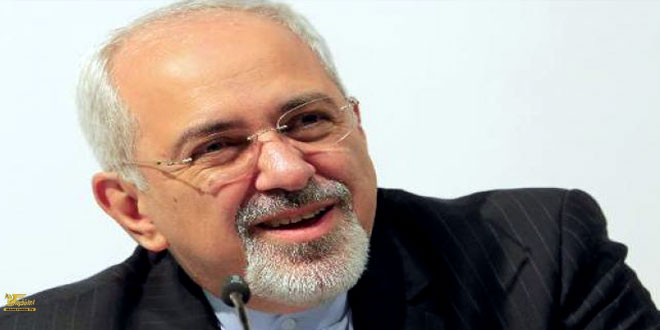
By Jennifer Rubin
The Obama administration’s hint that it was considering allowing Iran to access directly or indirectly U.S. dollars drew furious, negative reaction from both sides of the aisle. Read More »
THE WASHINGTON POST

By Jennifer Rubin
The Obama administration’s hint that it was considering allowing Iran to access directly or indirectly U.S. dollars drew furious, negative reaction from both sides of the aisle. Read More »

By Patrick Goodenough
(CNSNews.com) – Secretary of State John Kerry said Monday night that Iran has reaped just $3 billion so far as a result of the nuclear deal, despite critics’ claims that it would get more than $100 billion in frozen assets. Read More »
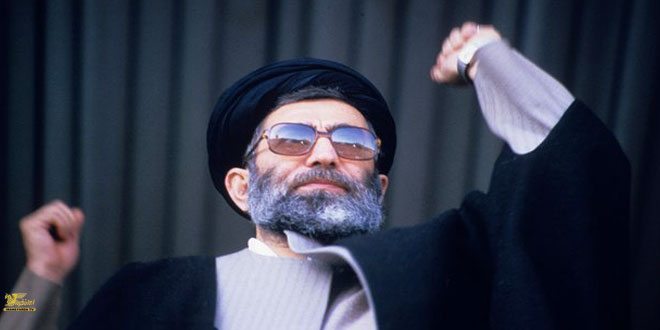
As with the nuclear agreement, supreme leader Ali Khamenei and President Rouhani may have more in common than in dispute over the economy and foreign investment
Gareth Smyth for Tehran Bureau 19 April, 2016
The relationship between Ayatollah Ali Khamenei, Iran’s leader, and president Hassan Rouhani has been at the heart of the domestic political realignment that made possible last July’s nuclear agreement with world powers and the strong showing for pro-agreement candidates in February’s elections for parliament and Majles-e Khobregan (the Experts Assembly), the clerical body that chooses the leader. Read More »
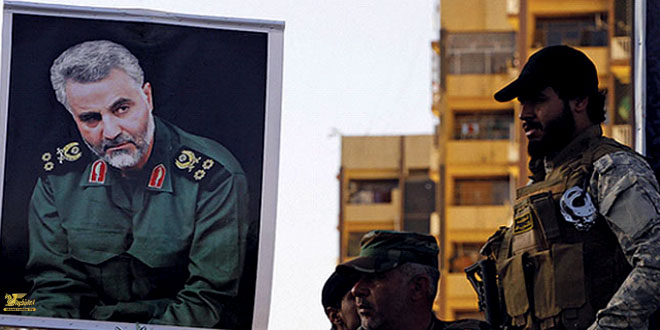
Not a Shiite religious figure and not a martyr, Qassem Soleimani, the living commander of Iran’s elite Qods Force, has been elevated to hero status.
By Scott Peterson,
For years the commander of Iran’s elite Qods Force worked from the shadows, conducting the nation’s battles from Afghanistan to Lebanon.
But today Qassem Soleimani is Iran’s celebrity general, a man elevated to hero status by a social media machine that has at least 10 Instagram accounts and spreads photographs and selfies of him at the front lines in Syria and Iraq. Read More »

The reminders are ever present in Tehran. On billboards, public buildings, street signs, and hanging on office walls, there are portraits of Iran’s Supreme Leader, Ali Khamenei. Read More »
THE GUARDIAN

By: Saeed Kamali Dehghan Iran correspondent
With its depiction of Iran under late shah’s despotic rule comes Shahrzad, an independent online drama with parallels in current events
A scene from Shahrzad. The series has viewers glued to their screens in a country where independent online series are a new departure. Photograph: Amirhossein Shojaee/shahrzadseries.com
Footsteps resonate on cobblestones, snooker clubs are open, women and men go partying together, cabarets are full, the alcohol flows, chapeaux are fashionable, the national theatre is showing Othello and, in the small cinemas along Lalehzar – old Tehran’s Champs-Élysées, Casablanca is showing.
This is Iran 1950s-style, brought back to life in the online TV series Shahrzad, the most expensive production of its kind in the country. Once a week, when a new episode is released, the show has the whole nation glued to their screens.
Netflix may not have yet infiltrated Iranian households, but its style of gripping filmmaking has. Shahrzad is drawing huge audiences in a country where independent online series, produced privately, are becoming increasingly popular as people turn their backs on tightly controlled state television for online substitutes or illegal satellite channels.
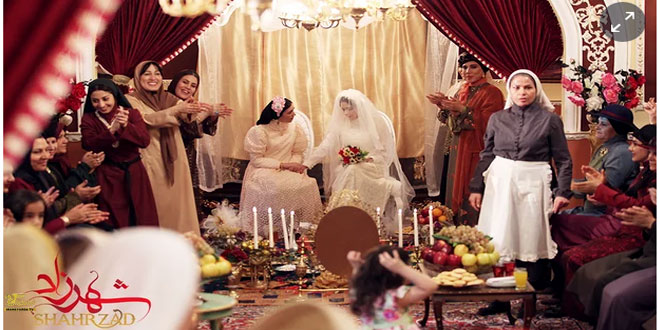
Inline image 2
Like most films made in Iran, Shahrzad has already been approved by the censors – every single scene, each dialogue and costume has been carefully examined to make sure it adheres to the norms. The result, however, is a series that treads a fine line, even even at times showing the generally unshowable, such as women singing.
In the TV drama, Shahrzad is forced to marry against her wishes. Photograph: Amirhossein Shojaee/shahrzadseries.com
And out of a depiction of Iran under the late shah’s despotic rule comes a drama that draws many parallels to politics in the country today.
Directed by Hasan Fathi and written jointly with playwright and university professor Naghmeh Samini, Shahrzad is the story of a love broken apart by events in the aftermath of the 1953 coup that overthrew the democratically elected prime minister, Mohammad Mosaddeq.
That coup, engineered by the CIA and British intelligence to safeguard the west’s oil interests, consolidated the shah’s rule until the 1979 Islamic revolution. It was a defining moment in Iran’s modern history, the reverberations of which are still felt today.
Shahrzad, a medical student, and Farhad, a journalist, often meet at the Cafe Naderi, a hub for intellectuals in the city. Farhad, an ardent supporter of Mosaddeq, is jailed after the shah’s security forces close down his newspaper. Shahrzad, meanwhile, is forced to marry against her wishes and become the second wife of the son-in-law of Bozorg-Agha, a hugely influential Godfather-like figure who is close to the shah. But the forced marriage does not separate the pair.
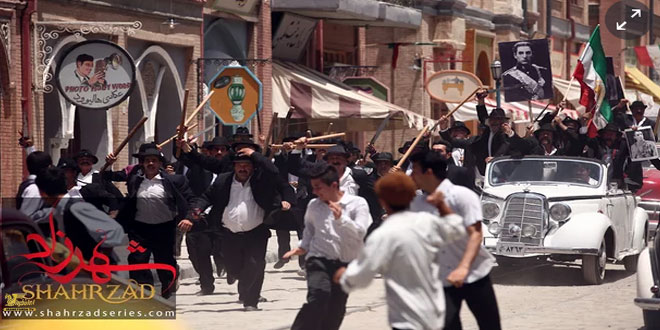
Inline image 3
The series portrays the crackdown that took place at the hands of the Shah’s forces. Photograph: Amirhossein Shojaee/shahrzadseries.com
The series portrays the repression that took place at the hands of the shah’s forces, with journalists and intellectuals summoned, intimidated or jailed arbitrarily and newspaper licences revoked. Those scenes strike a chord in today’s Iran, in the light of more recent crackdowns against journalists and activists, especially after the 2009 post-election unrest.
Not all historical references in Shahrzad are accurate, says film critic Parviz Jahed, but “good storytelling has made it an intriguing and successful melodrama set against the backdrop of an important episode in Iran’s modern history”.
“There are things that are absent from a state TV production, such as the displaying of music instruments or women singing, but you’ll see them in Shahrzad,” he said. “These series made outside the state TV apparatus and produced privately are a new phenomenon.”
Shahrzad is not solely critiquing Iran’s past politics, but also subtly highlighting beliefs and norms considered wrong and anachronistic that are nonetheless still present in Iranian lives. Striking, too, is the fact that some of its characters, such as Bozorg-Agha, who is allied to the shah, are not depicted in an unambiguously negative way.
Scenes that include musical instruments are normally absent from state TV productions. Photograph: Amirhossein Shojaee/shahrzadseries.com
“In the past, you couldn’t approach such characters in a humanising way, but characters such as Bozorg-Agha at times even evoke sympathy and that’s something new,” Jahed said. “You couldn’t show charismatic figures in bad characters previously.”
Each episode of Shahrzad is sold on a weekly basis on its website. It is also available from shops across the country on DVDs. Producers have been urging Iranians to respect copyright and not buy pirated versions. But in a country where copyright is widely violated with regard to artistic works, that is a huge challenge.

Inline image 4
The success of Shahrzad comes at a time when Iran’s fight against illegal satellite dishes appears to have been lost. Turkish soap operas, transmitted by companies such as Dubai-based GEM TV, are extremely popular in the country, where Farsi-dubbed versions showing love triangles, such The Tulip Age, are even available on USB sticks.
Observers say the extent to which the authorities appear to have tolerated red lines being crossed in Shahrzad appears to indicates a new, more flexible approach by the authorities.
Although ordinary people don’t have access to Netflix, mainly because of issues relating to Iranians’ access to foreign payments, its TV series like Breaking Bad are popular in Iran. “Most people have seen series like Breaking Bad or Fargo in Iran; they are dubbed in Farsi on the black market,” Jahed said. “That’s made it difficult for the Iranian filmmakers. They have to live up to those standards.”

Most of the sanctions on Iran were lifted earlier this year, but the expected rush of international investment has yet to follow. Instead, things have been going frustratingly slowly when it comes to deals being signed. Read More »
Bulletin of the Atomic Scientists

By: Ariane Tabatabai
On April 17, 2016, Iran’s Foreign Ministry presented itsfirst progress report on implementation of the Joint Comprehensive Plan of Action (JCPOA), the deal concluded last summer between Tehran and six world powers to scale back Iranian nuclear activities in exchange for sanctions relief (link in Persian). The Foreign Ministry plans to present such a report to parliament every quarter, with the ostensible goal of assessing headway on implementation. The first installment, though, while highlighting Tehran’s compliance with the JCPOA, also shows the government of President Hassan Rouhani, the moderate leader who championed negotiations, still trying to sell the deal at home. Read More »
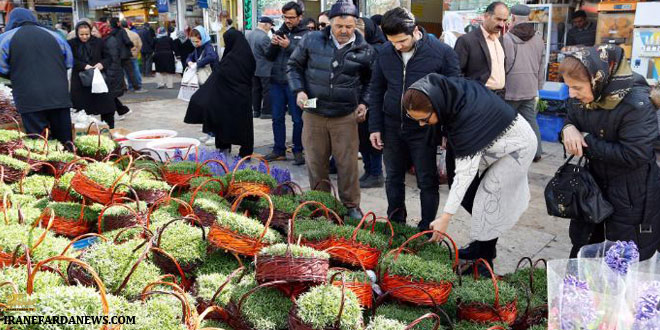
By Reese Erlich
Remember the $150 billion windfall from the nuclear deal that US hawks said Iran could use to sponsor terrorism? Turns out the Iranian government has brought back $7 billion, and most of it will be used for development projects, according to Iranian officials and economists — projects that the country, reeling from low oil prices, sorely needs to restart economic growth. Read More »
Business Insider

Iranian Revolutionary Guard Commander Qassem Soleimani (L) stands at the frontline during offensive operations against Islamic State militants in the town of Tal Ksaiba in Salahuddin province March 8, 2015.
MOSCOW (Reuters) – Iranian Major General Qassem Soleimani has flown to Moscow for talks with Russia’s military and political leadership, three sources with knowledge of his trip said on Friday. Read More »